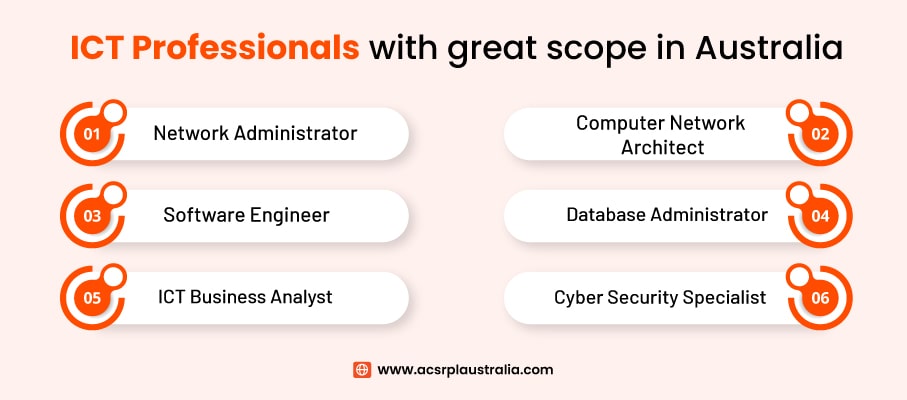
Australia is the leading country in the field of information technology. The technological field of Australia has reached a global stage gaining a lot of attention from people all around the world. The current pace of technological advancement demands skilled personnel able to handle the task. Rapid changes in technology and the ease with which people adapt to them have a big effect on the need for professionals. Australia is a place where you can express yourself freely. The educational institutes will provide you with access to the most up-to-date technology, allowing you to develop and implement your own innovative ideas while pursuing a rewarding IT career in Australia.
Australia employs skilled professionals to fill the gap in IT sectors. This puts you in a better position to learn and demonstrate both technical and non-technical skills. Australia is always welcoming migrants that can contribute to the economic growth of the country. According to ACS, the demand for ICT jobs for skilled migrants has been increased significantly.
ICT professionals have a lot of career and job opportunities, and demand is growing much faster than in other fields. All industries, but particularly large corporations, require ICT specialists. If you want a steady job with predictable hours, you should work for a large corporation. Here we will be describing some of the ICT professionals that have great scope in Australia.

Network Administrator
Network administrators install, maintain, and troubleshoot network software and hardware, as well as ensure network security, availability, and performance. They also install, optimize, and secure new systems, as well as optimize existing systems to reduce costs and increase productivity. Network administrators are usually part of a team of IT professionals who specialize in different areas. In Australia, the average network administrator salary is $100,139 per year ($51.35 per hour). The starting salary for entry-level positions is $91,019 per year, with most experienced workers earning up to $125,076 per year.
Computer Network Architect
Network architects may design local area networks, wide area networks, or intranets. To ensure that networks function efficiently and remain technologically current, computer network architects plan and implement maintenance and updates of computer networks. People in this field can work for computer network services companies or directly within a corporation or government agency. In Australia, a Networking employee typically earns around 84,600 AUD per year. Salaries range from 67,600 Australian dollars (lowest average) to 108,000 Australian dollars.
Software Engineer
Software engineering is the field of engineering which focuses on designing, developing, and supporting software. This procedure ensures that applications are built correctly, in a timely manner, and at an affordable cost. Software engineering has also become more popular as a result of the rapid changes in user requirements and the environment in which an application is supposed to operate. In Australia, the average software engineer salary is $116,803 per year, or $59.90 per hour. Starting salaries for entry-level positions start at $100,003, with most experienced workers earning up to $157,171 per year.
Database Administrator
Database administrators ensure that software and hardware are kept up to date, allowing vital data to be stored, accessed, and used with ease. Database administrators also assist in data security and collaborate with other IT professionals in teams. In Australia, the average salary for database administrators is $97,137 per year, or $49.81 per hour. The starting salary for entry-level positions is $97,137 per year, with most experienced workers earning up to $97,137 per year.
ICT Business Analyst
ICT Business analysts look at a company (or a part of a company) to see how it can improve its performance. A strong information technology component is almost always present. This is due to the fact that information technology is essential to modern business operations. Analysts may, for example, investigate the consequences of changing computer software. Because job requirements differ from company to company, analysts must be adaptable. To work as a business analyst, you’ll most likely need to start with an entry-level position and work your way up. Business education, as well as advanced IT training, gives you an edge. In Australia, the average ict business analyst salary is $109,711 per year ($56.26 per hour). Entry-level jobs start at $88,205 per year, with the highest-paid workers earning up to $147,183 per year.
Cyber Security Specialist
Cybersecurity experts ensure that computer systems and networks are secure. They’ll need a broad technical background because security is a major consideration in almost every aspect of a modern computer system. For cybersecurity specialist jobs, and IT-related degree is usually required. Except for graduate or assistant positions, experience is required, and certifications may give you a significant advantage over other applicants. The average salary for cybersecurity professionals is very high. Demonstrated expertise in a difficult field can put you in a powerful position in your career. In Australia, the average salary for a cyber security specialist is $104,236 per year or $53.45 per hour. The starting salary for entry-level positions is $90,396 per year, with most experienced workers earning up to $148,430 per year.
ICT Profession and RPL report
This is an opportunity for ICT professionals to show their skills by preparing an RPL report that is authorised by the Australian Computer Society (ACS). Professionals with an ICT background can benefit from this skilled migration pathway to migrate to Australia. The Australian government offers ICT experts their dream jobs by welcoming them to live here. Overseas applicants and applicants outside the ICT field must prepare Recognition of Prior Learning (RPL) applications.
The Australian Computer Society will access the skills and knowledge a candidate possesses and determine their ability. It is the primary objective of ACS to identify and retain people working in the ICT industry who possess the necessary skills and certifications and are eager to relocate to Australia for a better life.
Applicants who have tertiary credentials with little or no ICT content, or who have no recognized tertiary qualifications, should use the RPL application process.
- An AQF Diploma or higher without adequate ICT content requires you to have 6 years of relevant work experience at any time in your past work history, as well as an accepted Recognition of Prior Learning (RPL) application.
- You’ll need 8 years of relevant work experience and any approved Recognition of Prior Learning (RPL) application to be considered for the program.
As part of an RPL application, you must show how you learned your ICT skills and submit two project reports. For the skill assessment, you must meet certain qualification criteria for Recognized Prior Learning.
Why ACSRPLAustralia for RPL Report?
ACSRPLAustralia is a well-known Australian company that writes and reviews RPL reports. We are familiar with the format and requirements for submitting an ACS RPL application. RPL reports can be prepared with the help of our highly qualified and experienced ICT experts. We are well aware that the Australian government adheres to a very strict immigration policy. With the best team of RPL report writers, we provide the best ACS RPL report writing service. Professional experts are available to assist you 24 hours a day, 7 days a week to help you realize your migration goals.
